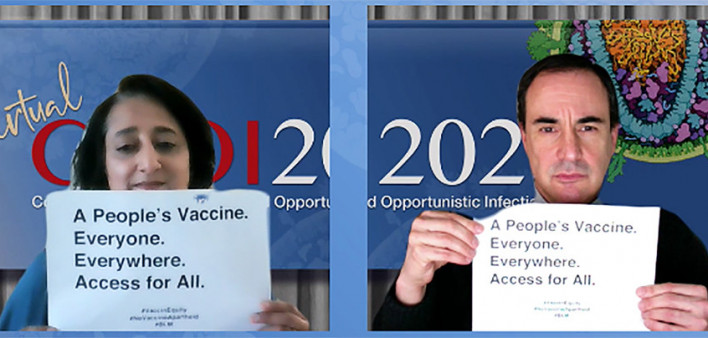At the virtual Conference on Retroviruses and Opportunistic Infections (CROI) this week, Fatima Hassan, of the Health Justice Initiative in Cape Town, and Gregg Gonsalves, PhD, of Yale School of Public Health, kicked off the opening session with a discussion entitled “Vaccine Nationalism is Killing Us: How Inequities in Research and Access to SARS-CoV-2 Vaccines Will Perpetuate the Pandemic.”
The two recalled that after the development of effective antiretroviral therapy for HIV in the mid-1990s, it took years before effective new treatments were widely available to people in low- and middle-income countries—and they warned the same thing could happen again with COVID-19 vaccines.
Now available to all on YouTube: the vCROI 2021 Martin Delaney Presentation, “Vaccine Nationalism Is Killing Us: How Inequities in Research and Access to SARS-CoV-2 Vaccines Will Perpetuate the Pandemic.” https://t.co/uJySj7JJU6
— IAS–USA (@IAS_USA) March 9, 2021
Three COVID-19 vaccines—from Pfizer-BioNTech, Moderna and Johnson & Johnson—are authorized in the United States. Several others, including vaccines from AstraZeneca and the University of Oxford and Novavax, Russia’s Sputnik V, India’s Covaxin and China’s CanSino and CoronaVac are now being used in other countries.
While the COVID-19 vaccine rollout is proceeding speedily in the United States—and the United Kingdom and Israel have already vaccinated a substantial proportion of their population—the same can’t be said for the rest of the world.
“Only a small proportion of the planet will be vaccinated this year,” Gonsalves said. “It’s miraculous that we have very effective vaccines a year out. We have the tools we need to do this—it’s no longer a scientific problem, it’s a political crisis.”
As they did for AIDS, advocates aim to change that. Scientists, public health and legal experts and community leaders from around the world have issued a Call for Global Vaccine Equity.
“One year into the COVID-19 pandemic, after over 100 million cases and 2.5 million deaths globally, we could lift the strain on our communities, health systems and economies by prioritizing truly global immunity to control the pandemic,” the statement reads. “Instead, inequity in global access to COVID-19 vaccines is causing needless deaths, prolonging the pandemic and viral transmission that fosters variants that undermine vaccine efficacy. We call on global leaders to share vaccine knowledge and expand global capacity for vaccine production. We must use vaccines this year to control epidemics around the world, not just in a few high-income countries.”
The COVAX initiative, led by the World Health Organization, GAVI and the Coalition for Epidemic Preparedness, is working to accelerate the development and manufacture of COVID-19 vaccines and to guarantee fair and equitable access for every country in the world. So far, according to GAVI, COVAX has shipped over 28 million vaccine doses to 37 countries. But advocates estimate that at the current pace, countries that rely on the COVAX vaccine will have enough vaccine to cover only about 3% of their adult population by mid-2021 and about 20% by the end of the year.
“Limited vaccine supplies are being allocated by wealth and geography, not by science, public health or human need. Globally, it is disproportionately Black and Brown communities excluded from accessing the benefits of science,” the statement continues. “We must remove the artificial scarcity by making the incredible work of vaccine scientists and developers, much of it financed directly or indirectly by public funding, open to all countries.”
Earlier today, I joined other doctors & public health & human rights activists to #FreetheVaccine
— Dr. Lipi #PeoplesVaccine Roy (@lipiroy) March 12, 2021
Millions of people in low-income countries won’t get the COVID vaccine til 2024.
We can’t end the pandemic anywhere if don’t end it EVERYWHERE. @R2HAction #PeoplesVaccine https://t.co/pkZ30tCPKa pic.twitter.com/JyOt1WEdUN
The call notes that vaccine production could be expanded within months in Africa, Asia and Latin America if technology and know-how are shared more widely. Companies that received public funding should voluntarily step up with licensing and share their expertise with multiple producers, it says, adding that temporarily suspending the enforcement of intellectual property rights during the pandemic will not undermine innovation and research.
"In a world where there are enormous inequalities, COVID vaccinations offer us the opportunity to provide everyone globally, regardless of income, race, or nationality, immunological equity to be protected from SARS-CoV-2," the statement concludes.
Sign on to the Call for Global Vaccine Equity here.
AVAC has put together an Advocate’s Guide To COVID-19 Vaccine Access to help inform and support advocates.
Click here for more news about COVID19 vaccines.







Comments
Comments